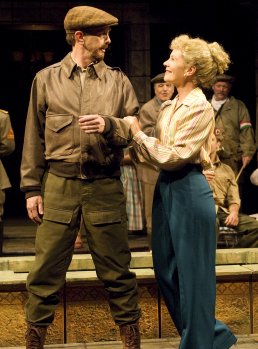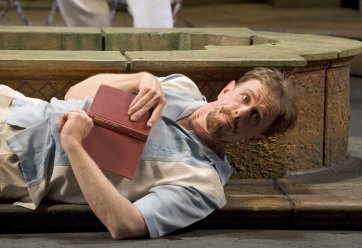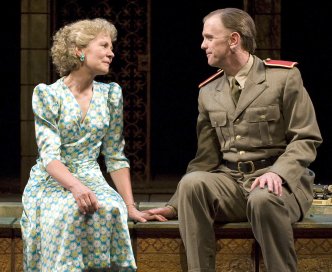Summary 
Outdoor production modernized to the end of Italian participation in World War Two, with a subtly played notion that the elements of love with the returning resistance fighters continue to struggle against the jack-booted hatred represented by Don John. Bolstered by one-half of an exceptional eavesdropping scene, the energy flags afterward, and the characterizations range from the pleasantly adequate to the weakly played.
Design
Directed by Kate Buckley. Set by Todd Rosenthal. Costumes by Nan Cibula-Jenkins. Lights by Robert Peterson. Compositions and sound by Sarah Pickett. Choreography by Jim Giancarlo. Fights by U. Jonathan Toppo.
Cast
Bill Geisslinger (Leonato), Robynn Rodriguez (Beatrice), Sarah Rutan (Hero), Mark Murphey (Antonio), Todd Bjurstrom (Borachio), Peter Macon (Don Pedro), Christopher Michael Rivera (Don John), David Kelly (Benedick), Juan Rivera LeBron (Claudio), Tony DeBruno (Dogberry).
Analysis
A trumpet fanfare by a waving bugler in a window high above the stage proclaims the imminent curtain, and the public address announcer sets a pleasant Italian mood with her "enjoy the show, Ciao!" closing remark. Staged outdoors in the Oregon Shakespeare Festival's Elizabethan theatre, Kate Buckley's Much Ado About Nothing is modernized to 1945 near the end of the second World War in Italy, with the returning soldiers as Italian partisans fighting a resistance against the Nazis. The setting is a brightly lit Italian courtyard, with an old style victrola record player and an old-fashioned typewriter on the edge of a downstage fountain pool. Orange and brown mosaic tile colors the stage, and ornate wrought iron fence and railing line upstage and the balcony.

Robynn Rodriguez's Beatrice, wise and mature but hard-edged, wears green slacks and a blouse in the company of women and servants wearing dresses, and she toils away at the typewriter while Leonato listens to a scratchy old record and lounges with a newspaper. When a warplane passes overhead, people emerge from windows and doorways to watch, obviously in anticipation of the soldiers' return. When the first returning soldier sings along with Leonato's record, they cheer and embrace him. Rodriguez's soft-spoken Beatrice is clipped and acerbic in speech, and she has her best moments in 1.1 at center stage - smart, sour, sophisticated - but becomes somewhat lost thereafter, less colorful and certainly less strident. After a wicked opening in which she abuses Benedick - the "stuffed man" - she submerges within the plot and bevy of onstage characters.
Don Pedro's army returns to pounding drums, the booted soldiers wearing armbands of the Italian flag colors, and carrying packs and rifles. David Kelly's Benedick sports a goatee and wears a beret and a faded bomber jacket, and he is tall and lean, a boyish gentleman of years beyond his appearance. He horse-plays with Claudio, then leaps up onto the fountain to proclaim, clearly an older man trying to act younger. When he and Beatrice spy each other from opposite sides of the stage, Benedick edges closer and closer to Beatrice as they trade insults, and they intimate a deep previous relationship. Kelly's Benedick, despite a youthfully mature appearance, also becomes lost in the swarm of characters, including the cigar-puffing Don Pedro, a Rhett Butler-like Antonio squinting and smoking a pipe, and the villains: the tuxedoed Conrade, who seems to be channeling the Mafiosi, and inside-man Borachio, a rotund waiter in the Leonato household. The villains are led by Don John, here a slick neo-Nazi with a cigarette and a brandy snifter, resembling the type of rigid Axis soldier that Don Pedro and his resistance fighters would have been combating.

The remainder of the first act sandwiches Benedick's remarkable - and quite funny - 2.3 eavesdropping scene between a masque and the trickery of Beatrice. The masque features Beatrice - now more feminine in a gown and earrings, but conversely less droll - and Benedick leading the men in tuxedoes, brandishing cigars and brandy in snifters. While the villianous Don John spies upon them from the balcony, Don Pedro encourages the dancers with hand-claps and foot-stomps, and the scene plays with a feather-light but uninteresting breeziness, extended by an elegant if ordinary series of dances. After Claudio, handsome but lacking vigor, is presented with Hero's hand, Don Pedro leads him and Leonato into the deception scenes - "we are the love gods!" - and Buckley's production energizes and elevates. The love gods perform a barbershop-quartet version of "Hey Nonnie Nonnie" with Balthazar - after he compromises Benedick by returning with the requested book and giving him an exaggerated wave - before listening to his solo "Sigh No More" as Kelly's limber Benedick conceals himself on the audience side of the downstage fountain. Kelly's antics provide the finest moments of the production - he whips the book offstage then dives after it, eavesdropping from the first row of the audience; he sneaks all the way around to upstage, bumping the record player and slamming the lid closed; he echoes his three friends' exclamations of "oh no!" with a fourth cry - culminating with his full-body plunge into the pool (and lengthy submersion) when Don Pedro and his schemers draw near. After a long moment Kelly spews like the fountain itself, then leaps to his feet in a furious splash of water. Kelly's exclamations - "this can be no trick!" and "the world must be peopled!" - are delivered with a vital energy that delights the audience, and Kelly finishes the scene with memorable flair: he swigs from a wine bottle at the notion of being loved by Beatrice; he stands in the pool to soliloquize, lifting a drenched leg to rest a loudly dripping foot on the fountain's edge; and he feigns casually reading the book while lounging absurdly within the fountain pool when Beatrice summons him to dinner. The three love gods - after an exaggerated sigh at the uniting of the two souls - watch their handiwork from behind an upstage wrought iron gate, then dance off in mock victory.

The scene, naturally played and wildly funny, earns raucous and spontaneous applause, but the production peaks with the moment, never again matching the vibrancy, humor or energized delivery. Rodriguez's eavesdropping scene is good, but feels abbreviated in comparison. After servants mop and squeegee the water-soaked stage, Rodriguiz's Beatrice scampers into the balcony to overhear Hero and Ursula. When she needs to be closer, the thumping sound effect of her rapid (but lengthy) descent is heard, and she gasps while listening, then rapidly feeds herself from a bowl of snack food. Moments later, Benedick is exposed clean-shaven and newly groomed and intermission arrives, the public address announcer concluding it with a prohibition against cell phones via a pleasant, "grazie."
An understated performance of Dogberry and the watch would usually be quite welcome, but in an already understated and quietly acted production, the comical low-humor scenes slow the show's pace even further. Tony DeBruno's well-meaning Constable - with his signature-move high salute and thigh slap - earns an appreciate laugh when, after his comment regarding "the flag on the roof," he pauses, leans far back, and reflects for a moment on the flag waving from atop the open roof high above. The remainder of the production, while nicely staged - the lighting effects on the eight multi-colored window awnings are particularly lovely - is fairly straight-forward and mildly entertaining: Hero faints at her accusation, when only Beatrice takes her side; Rodriguez's Beatrice draws a hearty laugh with a stern "Kill Claudio" that recalls her confidence and tone from the opening moments; Leonato and Antonio don tuxedoes with black arm bands to mourn Hero; and Hero "notes" Claudio's confessional below from above in the balcony.
Buckley concludes the production literally on a strong note, with an impressive choral performance by the cast at the close of the Hero funeral ceremony. After Beatrice and Benedick take frustrated turns typing poetry at the typewriter, Claudio gains the last big laugh - "another Hero!" - and the reunion of the two sets of lovers is complete. Benedick tap dances a comedy-routine rim shot, and Beatrice is shoved from behind toward him, and they then make faces of disgust and disbelief at each other's sonnets, uttering an evil laugh and an exasperated "oh, baby!" Their embrace is applauded by the cast, and their passionate kiss is met with hoots and hollers, and the production concludes, albeit with a melancholy Don Pedro seated and alone downstage.